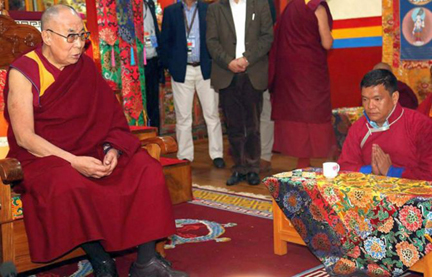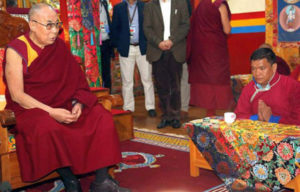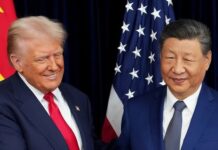

BEIJING: China today warned India that the Dalai Lama’s visit to Arunachal Pradesh will have “negative impact” on the settlement of the border dispute and accused New Delhi of violating its commitment on the Tibet issue.
Chinese foreign ministry said Beijing will take “further action” to safeguard its territorial sovereignty and slammed the “provocative” statements of the Tibetan spiritual leader and the Chief Minister of Arunachal Pradesh, Pema Khandu, who has said that the state shares its border only with Tibet, not with China.
In the strongest comments since April 4, when the 81- year-old Dalai Lama began his visit to Arunachal Pradesh, parts of which China claims as Southern Tibet, foreign ministry spokesperson Lu Kang said their “provocative” statements “exceeded the scope of religious activities.”
Lu said despite China’s objection, India insisted on arranging the Dalai Lama’s visit “in the disputed areas of the eastern section of the China-India boundary”. He also said that “some specific Indian official” had indulged in provocative political statement but did not name Pema Khandu.
“China has lodged representations with the Indian side and we will take further action to safeguard the territorial sovereignty and national security,” Lu said, without elaborating.
“What India has done is violated the solemn commitment on Tibet-related issues and it also has negative impact on proper settlement of the territorial disputes between the two sides through negotiations,” the spokesperson said.
He said the boundary and Tibet-related questions “bear the political foundation of China-India relationship” and the two countries have reached “important consensus” of resolving the dispute through talks and consultations.
“We hope that the Indian side bear in mind the fundamental interests of the two countries and the two peoples and safeguard the political foundation of the bilateral relationship and do not take any provocative actions,” he said.
Asked to elaborate what “negative impact” he was referring to on the border dispute, Lu said, “I would like to correct one mistake in your remark, I said the Dalai Lama was visiting the disputed eastern section of the China-India boundary. It’s not the Indian territory. The Indian government has made solemn commitment on Tibet-related issues and the boundary question,” he said.
“We have lessons to learn from history. When the Indian side violated commitments on the relevant issues, the Indian side insisted on arranging the visit of the Dalai Lama in the disputed section of the China-Indian boundary and indulged in provocative political statements. We have already expressed our solemn representations and it will of course have negative impact on bilateral relations,” he said.
India and China have been negotiating to resolve the border dispute for more than 20 years but an agreement is yet to be reached. The dispute covers the 3,488-km Line of Actual Control.
While China claims parts of Arunachal Pradesh as Southern Tibet, India asserts the dispute also covers the Aksai Chin area, which China occupied during the 1962 Sino-India war.
Lu also termed the Dalai Lama’s visit a “disgraceful performance”, which will by no means change China’s position on the border and Tibet-related issues nor the fact that the Tibetan government is “exercising effective administration”.
“The Dalai Lama has disgraceful performance on the boundary question. This time he called himself the son of India and also backed up unfounded statement by the official of the so-called Arunachal Pradesh of India,” Lu said.
“The Dalai Lama attacked the Chinese government on Tibet related issues and advertised his political views on splitting China. It showed the Dalai clique has already viewed itself as foreign,” he said.
China is opposed to the Nobel laureate’s visit to Arunachal Pradesh, particularly to Tawang, which happens to be the birth place of the sixth Dalai Lama in 1683. It is also at the centre of Tibetan Buddhism.
China’s media and foreign ministry has repeatedly aired their opposition to the Dalai Lama’s visit to the region. An article in the state-run China Daily today said the people of Arunachal Pradesh live “difficult lives” under India’s “illegal” rule and they look forward to returning to China.
Building on the argument in the leading daily, Lu claimed Tibet is achieving faster growth. “It will make people see clear that the Dalai Lama is “attempting to split China and damaging interests of all ethnic groups in China.” –PTI






